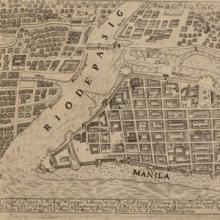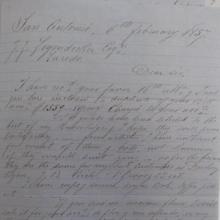Modern (1800 CE - 1950 CE)

Marshall Islands stick chart
Across millennia, Pacific people voyaged out to sea and settled the ocean’s thousands islands and atolls, linking new discoveries back to existing territories.

Short Teaching Module: History of the Pacific Ocean
Scholars of Pacific history explore how people build lives dependent on the ocean, how maritime connections create communities, and how humans and the environment shape each other.
Excerpt from the Kellogg-Briand Pact, 1928
Also known as the Pact of Paris, the Kellogg-Briand Pact of 1928 was an international agreement sponsored by the United States and France aimed to eliminate war as a means of conflict resolution on the international playing field following World War I.

Kansas-Nebraska Act, 1854
By the 1850s, tensions in the United States were falling in around a major issue: slavery. As the country expanded relentlessly westward and more territories and states were coming into existence, the question of slave states versus free states grew in its intensity.
Analyzing Official Documents
Official documents produced by governments, supranational organizations, courts of law, and more are abundant in supply, but can be intimidating and confusing to approach. They are often filled with language that seems convoluted, emotionless, and highly technical.

Primer: Global Urban History
Urban history is a rich subfield of historical scholarship that examines life in urban spaces, how communities within cities interact and coexist, as well as the process of city formation and urbanization.

Photograph from an Independence Protest, Alexandria, Egypt, 1919
Following the close of World War I, Egypt became a hotbed of anti-colonial nationalism. Leaders of the nationalist Wafd party formally demanded Egyptian independence to British and US officials, utilizing many of U.S. President Woodrow Wilson’s own phrases and rhetoric in their appeals.
Excerpts from Harem Years: Memoirs of an Egyptian Feminist, 1879-1924
The peace process that followed World War One catalyzed calls for self-determination around the colonized world. Existing nationalist organizations seized on the liberal pretensions of the Entente Powers to articulate social and political demands to colonial powers.
Native Languages of the Americas
Native Languages of the Americas is a potent and valuable resource for introducing historical and contemporary linguistics into the classroom as an extension of the discussion of native peoples in the Western Hemisphere.
Short Teaching Module: Connecting Local and Global History via Mercantile Networks
European merchants spread throughout the world seeking new markets. In doing so, they actively connected remote localities to global networks across multiple continents.